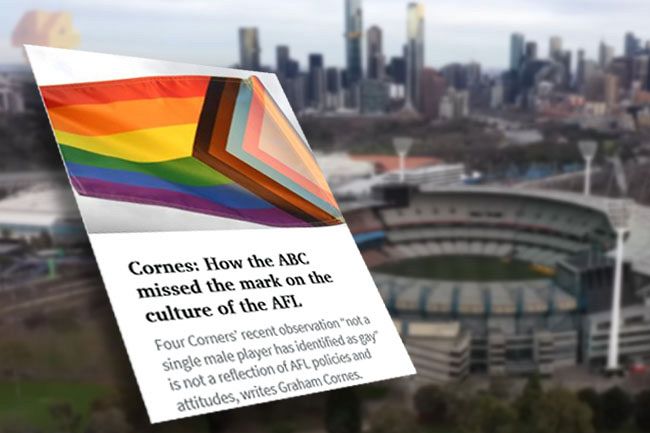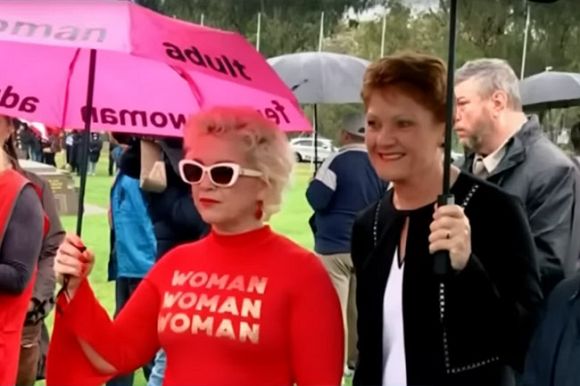A critique published by a former AFL coach over a Four Corners episode revealing homophobia within the AFL has completely missed the point, writes Melissa Marsden.
LATE ON FRIDAY evening, former Australian Football League player, coach and now media commentator, Graham Cornes, published an article in Adelaide-based The Advertiser, criticising an exposé by ABC current affairs program Four Corners.
The episode, hosted by veteran reporter Louise Milligan, aired on Monday 21 August and challenged the AFL’s persistent inability to foster a safe and welcoming place where LGBTQI+ players (in the male league) can “come out”.
Cornes immediately criticises the program for ‘attacking the AFL’ for fostering a ‘hyper-masculine culture’ that, for lack of a better term, encourages players to ‘remain in the closet’.
However, looking closely at the episode, it is difficult to see any anti-AFL aggression.
Rather, many people interviewed conveyed dismay at the prevailing culture, rather than any hostility towards the game.
Whilst the AFLW has been hailed as a “safe space for the queer community”, where all teams have participated in Pride rounds since their introduction in 2021, such progress has failed to trickle over to the men’s league.
Greater Western Sydney AFLW player Izzy Huntington pointed out that while the women’s league has been criticised as being a mecca for “lesbians” the fact the male league has no openly gay players is indicative of the culture within the sport.
In 2000, the Australian Government enforced a directive telling sporting organisations that they had a “legal and human rights obligation” to act on the discrimination faced by LGBTQI+ players.
Ten years later, this bigotry only continued, fostering a toxicity that actively discourages male footballers from expressing their sexuality.
In 2010, former Western Bulldogs star Jason Akermanis wrote a column for Sydney newspaper The Age, telling footballers to ‘not bother’ coming out and asking, ‘Is it worth it?’
When asked to reflect on the comments as part of the ABC’s story, Akermanis said he didn’t care if people were gay as long as they “don’t throw it in my face”.
This kind of attitude only serves to reinforce the narrative that, at least in the male league, being attracted to someone of the same sex is in some way wrong.
When commenting on the overall tone and language of the interviewees, Cornes argues:
‘There was not one iota of homophobia about their perspectives. On the contrary, all spoke of how welcoming they would be to any gay player who declared himself to the football world.’
To argue that as long as a gay person doesn’t display affection publicly in the same way as a straight person, shows the insidious way casual homophobia is allowed to permeate society.
In April, AFL CEO Gillon McLachlan confirmed to reporters that whilst there were gay players in the league, he understood why they chose not to be themselves.
Cornes’ comments demonstrate that whilst some progress has been made, oppression of the LGBTQI+ community continues to influence society.
Cornes argued that simply by financially supporting the emergence of a women’s league in which ‘many of its players are in same-sex relationships’, the ABC is contradicting its argument.
This fact, however, seems to say more about the relative inclusiveness of the women’s league than the overall culture of the AFL.
Indeed, LGBTQI+ players should not feel obliged to “come out”, however, the invisibility of these players in the AFL undoubtedly says something about the culture of the sport.
Cornes then went on to make a rather confusing argument in favour of “hyper-masculinity” in which he declared:
‘There is no need to apologise for hyper-masculinity. Hyper-masculinity is not toxic masculinity.’
What exactly does Cornes mean by this statement?
According to the European Institute for Gender Equality, hyper-masculinity is defined as:
‘Exaggerated image of hegemonic masculinity, mainly in the media. It overemphasises the ideals, such as physical strength, aggression and sexuality set out for men, thereby reinforcing them.’
In contrast, Professor of Sociology Michael Flood has identified toxic masculinity as being linked to
‘...a particular version of masculinity that is unhealthy for the men and boys who conform to it, and harmful for those around them [emphasising] the worst aspects of stereotypically masculine attributes [including] violence, dominance, emotional illiteracy, sexual entitlement and hostility to femininity.’
It is difficult, therefore, to see the basis of Cornes’ argument.
Whilst indeed based on these definitions, toxic masculinity may not always be present in displays of hyper-masculinity, it is clear hyper-masculinity is often a visible element in its toxic relation.
The ABC story on homophobia in the AFL helped shine a light on an important issue that is in the public interest.
Whilst indeed ‘The toughest man can have the softest heart’, Cornes either missed the entire point of the program or didn’t want to hear it.
Melissa Marsden is a freelance journalist and PhD candidate at Curtin University. You can follow Melissa on Twitter @MelMarsden96, on Bluesky @melissamarsdenphd or via Melissa's website, Framing the Narrative.
Related Articles
 This work is licensed under a Creative Commons Attribution-NonCommercial-NoDerivs 3.0 Australia License
This work is licensed under a Creative Commons Attribution-NonCommercial-NoDerivs 3.0 Australia License
Support independent journalism Subscribe to IA.















